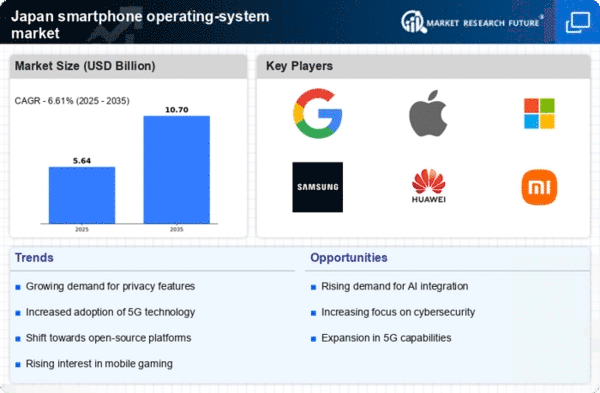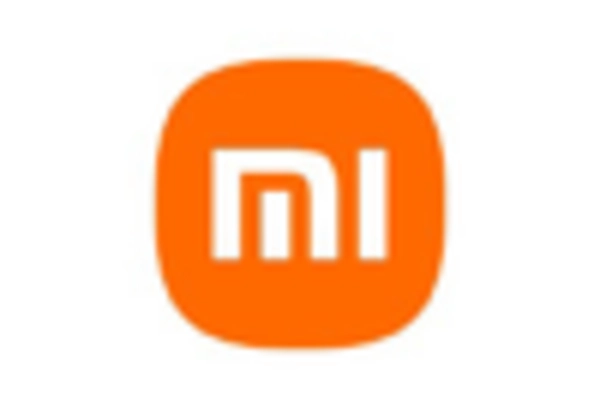Emergence of 5G Technology
The emergence of 5G technology is a transformative driver for the smartphone operating-system market in Japan. As 5G networks become more widespread, the demand for operating systems that can support high-speed connectivity and low latency is escalating. In 2025, it is projected that 5G subscriptions will surpass 50 million in Japan, creating a pressing need for operating systems to optimize performance for 5G-enabled devices. This shift not only enhances user experiences but also opens new avenues for applications that require robust data transfer capabilities, such as augmented reality and cloud gaming. Consequently, the smartphone operating-system market is likely to experience significant growth as developers adapt their platforms to harness the full potential of 5G technology.
Increased Focus on User Experience
User experience has become a critical driver in the smartphone operating-system market in Japan. As competition intensifies among manufacturers, the emphasis on creating intuitive and user-friendly interfaces is paramount. In 2025, it is anticipated that over 70% of consumers will prioritize user experience when selecting a smartphone, influencing operating system design and functionality. This trend compels developers to innovate continuously, integrating features that enhance usability, such as gesture controls and personalized settings. Additionally, the rise of voice-activated assistants and smart home integration further shapes user expectations, pushing operating systems to evolve accordingly. As a result, the smartphone operating-system market is likely to witness sustained growth, driven by the demand for seamless and engaging user experiences.
Growing Demand for Mobile Applications
The smartphone operating-system market in Japan is significantly influenced by the growing demand for mobile applications. As consumers increasingly rely on smartphones for various tasks, from banking to entertainment, the need for diverse and high-quality applications has surged. In 2025, the mobile application market in Japan is projected to reach approximately $20 billion, reflecting a compound annual growth rate of around 15%. This growth drives operating system developers to enhance their platforms, ensuring compatibility and performance for a wide array of applications. Furthermore, the rise of app-based services, such as food delivery and e-commerce, necessitates continuous updates and improvements in operating systems to support these functionalities. Consequently, the smartphone operating-system market is likely to expand as developers respond to the evolving needs of consumers and businesses alike.
Regulatory Compliance and Data Protection
The smartphone operating-system market in Japan is increasingly shaped by regulatory compliance and data protection concerns. With the implementation of stringent data privacy laws, operating system developers must ensure that their platforms adhere to these regulations. In 2025, it is expected that compliance with data protection standards will be a key factor influencing consumer trust and brand loyalty. As users become more aware of their data rights, operating systems that prioritize security features are likely to gain a competitive edge. This trend may lead to increased investment in security technologies, such as encryption and biometric authentication, further driving innovation within the smartphone operating-system market. Consequently, the focus on regulatory compliance is poised to play a pivotal role in shaping the future landscape of operating systems in Japan.
Technological Advancements in Mobile Hardware
The smartphone operating-system market in Japan is surging due to rapid advancements in mobile hardware. Enhanced processing power, improved battery life, and superior display technologies are driving consumer demand for more sophisticated operating systems. As manufacturers release devices equipped with cutting-edge hardware, the need for operating systems that can leverage these capabilities becomes paramount. For instance, the introduction of 5G technology has necessitated updates in operating systems to optimize connectivity and performance. In 2025, it is estimated that 5G-enabled devices will account for over 60% of smartphone sales in Japan, compelling operating system developers to innovate continuously. This trend indicates a robust growth trajectory for the smartphone operating-system market, as consumers seek devices that can fully utilize the latest hardware advancements.
















